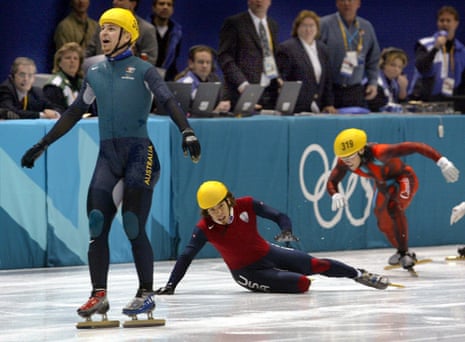Howls of derision greeted Steven Bradbury as he walked to the podium to collect his gold medal in the 1000m short-track speed skating at Salt Lake City in 2002.
Competing in his fourth Olympics, the veteran skater had pulled off the unlikeliest of wins thanks largely to three miracles in three straight races.
“Wipe that grin off your face, buddy,” shouted a US fan, grumpy at the outcome. One voice among many in an arena howling at the perceived injustice.
Apolo Ohno, the home favourite who was chasing his first Olympic medal, was leading in the final lap before a collision took out all but the Australian. Although the US spectators and much of the nation’s skating community called for a re-run after the infamous contest, Ohno has always accepted the result.
“Even when something seems certain, you’re coming around the last turn, in position to win – it’s still uncertain,” he wrote in his 2010 autobiography. “This race turned out just the way it obviously was supposed to happen.”
In this event, it was hard to argue that Bradbury, had not received some sort of higher help. He had progressed beyond the quarter-finals after some last-corner havoc. He snuck through the semi-finals after another late fall skittled more contenders. But when he also won the final in the same manner, there was nothing quiet about it.

This was a fluke heard around the world, the burgeoning internet embracing the sheer comedy of his unlikely win. Against a field that would ultimately win more than 20 Olympic medals, the odd one out was the last man standing.
He produced a feat so fabulous, the manner of it so fantastic it spawned dictionary entries. To “Do a Bradbury”: be the unlikely winner of an event; to win an event coming from well behind; to triumph unexpectedly, especially due to luck or the misfortune of others.
Bradbury explains his fortune with a mix of self-deprecation and self-regard. “I didn’t know whether I should put my arms up in celebration or go and hide in the corner,” he says on a personal hype video on his website, where he markets himself as a motivational speaker.
Should he accept the gold medal in those circumstances? Ultimately, he decided, yes. “I’m going out there on that podium and I’m taking that gold medal, but I’m not taking it for the 90 seconds of that race, I’m going to take it for the 12 years in the lead-up to that 90 seconds,” he says.
His talent, hard work and perseverance over more than a decade had allowed him to even reach the starting line. He was part of Australia’s outstanding relay team that won the country’s first Winter Olympic medal in 1994, and survived two serious accidents before he got to Salt Lake City.
But once there, Bradbury played the numbers. The Australian has credited a bold strategy – part conservative, part outlandish – for the gold and his country’s first ever Winter Olympic triumph: stay out of trouble.
after newsletter promotion
“It was a tactic that was built out of experience and judgment and knowing my own limitations,” Bradbury said last year, on the 20th anniversary of the race. The description of his approach from Ohno’s autobiography is slightly different: “It seemed almost laughable.”
But the Australian did it, and from there it took off. Carried by a mix of obscurity, slapstick, impossibility and Bradbury’s own self-deprecating charm – as an underdog widely understood, if not recognised – this Winter Olympics gold arguably brought more joy than any other. Of course, it helped that it was Australia’s first (beating the aerial skier Alisa Camplin by two days).
Roy and HG interviewed the skater soon after his victory, but the master sportscasters could add little to an outcome that could not be topped for hilarity. To this day, the race remains fertile source material: one part glory, but mostly giggles. An ABC TV comedy revisited it just two months ago.
And what of Bradbury himself, since we all shared his sheepish smile in Utah? He has presented at more than 1,350 events, lasted 12 days in the sixth season of Australian Survivor, and – after another remarkable quirk of fate – received a commendation for bravery for rescuing four teenage girls from drowning on the Sunshine Coast in 2022.
Steven Bradbury’s 2002 gold medal was the subject of the Guardian’s The Joy of Six in 2013

Comments (…)
Sign in or create your Guardian account to join the discussion